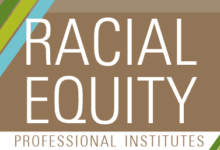Putting Pell Restoration, Building Tables, and Freeing Minds at the Forefront
“Building a table” is a phrase on a lot of lips these days, as many organizations and companies embrace the need to include diverse groups of people in decision-making to…

“Building a table” is a phrase on a lot of lips these days, as many organizations and companies embrace the need to include diverse groups of people in decision-making to ensure that equity is at the forefront of the process.
But what does it actually look like in practice?
It looks a lot like the recent Racial Equity Professional Institute put on by The Education Trust, in partnership with Operation Restoration, From Prison Cells to Ph.D., and the Vera Institute of Justice, which was rooted in racial inclusive pedagogy and showed that “building a table” is much more than a buzz phrase. The event focused on racial equity issues faced by incarcerated and formerly incarcerated students — especially around access to higher education — and gave participants an opportunity to engage with expert scholars, practitioners, and systems-impacted individuals.
Much of the discussion centered on Pell restoration implementation, now that the ban on Pell Grants for incarcerated people has been lifted. Despite this forward movement, the work is just beginning. There is a lot of planning needed about what implementation should look like in 2023 and, more importantly, how to ensure that Pell access won’t be stripped from justice-impacted individuals again in the future. The Institute brought together stakeholders to discuss two key issues related to the lifting of the ban:
Each session featured non-impacted and impacted people as moderators and contributors, giving participants unique opportunities to hear and reflect on both lived and academic experiences. Participants learned insights on topics such as the importance of advocacy in Pell Grant restoration and implementation, hiring people of color to direct higher education programs for incarcerated students, ensuring the quality of these education programs, and the need to provide tutoring and academic support for incarcerated and formerly incarcerated students.
The event was supposed to start with a keynote from Rev. Vivian Nixon, but technical difficulties led to an impromptu moment in which Wil del Pilar, Ph.D., Ed Trust’s vice president of higher education policy and practice, invited William Freeman III, a Justice Fellow and graduate student at Johns Hopkins School of Public Health, to share personal insights about what it is like to navigate the higher education system as an incarcerated and formerly incarcerated person, both inside and outside prison walls. This unexpected and unscripted moment was a great way to kick off the institute and set the perfect tone for the rest of the day: Thanks to the collaborative efforts of all involved, a justice-impacted person (Freeman) supported another justice-impacted person (Nixon) when things didn’t go as planned. Freeman’s message was both inspirational and informative, giving participants a glimpse into the life of someone who is making an impact in ways that might not be known otherwise.
Once the technical issues were resolved, Rev. Nixon responded to a question from Freeman on whether it was a good or bad thing that Pell Grants are coming out in 2023 rather than now. Nixon noted that faster isn’t always better:
“Maybe if we slowed down, we could convince philanthropy and we could convince our government to invest in community-based organizations that have been doing this work for decades. [We could have the time] to ramp up [and] to have the capacity to handle the implementation on a national level infused with the values and outcomes that we [justice-impacted people] want to see.”
Nixon called on entities to look at what is happening on a local level and invest in the organizations that have been doing the work for years. Universities have the capacity to educate thousands of incarcerated people, and many are excited about doing so. It is her hope and mine that universities and grassroots organizations can work together in thinking through both best practices on how to educate and engage incarcerated people through a trauma-informed pedagogy.
Nixon also cautioned against “going back to business as usual as if something cataclysmic didn’t just happen,” noting that something cataclysmic has happened: After a 20-year ban, Pell Grants have been restored for incarcerated people. As our country moves to reimplement Pell and remove educational barriers, it is so important for us not to forget about those who are incarcerated, as they are the ones in this very moment who are suffering from our country’s past doings, she and others emphasized.
Over the next two years, let’s work with universities to create programs that are both meaningful and educational. Let’s celebrate this win for people who are incarcerated, who will soon be able to pursue their educational goals with a new sense of autonomy, and for access to higher education, which has rightly been reinstated. No matter what the future may look like, one thing is true:
***Pell will be restored in 2023***
Patrick Rodriguez is an undergraduate student at Kennesaw State University and a fellow in The Education Trust’s Justice Fellows Policy Program.
The Education Trust’s next Racial Equity Professional Institute will take place on September 22, 2021, at 2:00 p.m. ET/11:00 a.m. PT. Building on the first institute, which centered on ensuring equity in Pell restoration implementation, the second institute will focus on developing the advocacy skills needed to address access and accountability. Register today.